Christ is risen! Truly He is risen!
The Story of how Thomas came to believe
Gospel: John 20:19-31
On the Sunday after the Resurrection, Christians both East and West celebrate the day when “doubting Thomas” came to faith.
Actually the man should be called “Believing Thomas”: When Jesus announced that He was going to Judaea, Thomas was a solid believer. In fact, he alone responded “Let us go and die with Him”. John 11:16.
After the Resurrection, Thomas had no monopoly on doubt. When the Women told the other disciples Christ is risen, it “seemed to them like nonsense”. Matthew 24:11. And that night, even as the risen Christ stood right before them, “they disbelieved for joy”, as some translations have it. Matthew 24:14 It was too good to be true!
Icons by permission of Saint Isaac’s Skete at skete.com
Thomas said “Unless I see 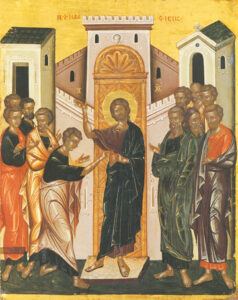 the nail marks in His hands and put my finger where the nails were, and put my hand into His side, I will not believe.” A week later “though the doors were locked, Jesus came and stood among them and said ‘Thomas, put your finger here; see my hands. Reach out your hand and put it into my side. Stop doubting and believe.'” And then Thomas was first of the Apostles to proclaim what the Church has believed ever since: “You are my Lord and my God!”
the nail marks in His hands and put my finger where the nails were, and put my hand into His side, I will not believe.” A week later “though the doors were locked, Jesus came and stood among them and said ‘Thomas, put your finger here; see my hands. Reach out your hand and put it into my side. Stop doubting and believe.'” And then Thomas was first of the Apostles to proclaim what the Church has believed ever since: “You are my Lord and my God!”
He is “Believing Thomas”!
Afterwards, Jesus told him, “Because you have seen me, you have believed. Blessed are those who have not seen and yet have believed.”
That would be us.
Our Stories
On the Monday after Thomas Sunday we sing “Blessed (happy) is the unbelief of Thomas”, for by him many who have doubted have been brought to faith. Indeed, over the centuries, a countless multitude have come to believe fervently in Jesus Christ and His Resurrection, though they have not seen Him.
How did this happen? On the face of it, that would seem extremely unlikely – that a billion people would believe that the salvation of the world, and their salvation, hangs on the Resurrection of one Man from the dead, twenty centuries ago.
I want to recommend an excellent book I just read: Thinking Orthodox by Eugenia Scarvelis Constantinou. At this late stage in my life, it has affirmed and clarified much for me – how we come to Faith not by reasoning our way in, in order to reach conclusions about God. Rather we come to Faith by His actions – and then our work, my work is only to try to understand what He has been doing with me, and why. For all their wisdom and rationality, that’s all the Church Fathers were doing.
For example at the very beginning, Thomas did not say to the other disciples “Prove to me logically that Jesus could rise from the dead”. He said “Unless I see, I will not believe.” If you are still trying to reason your way to God, please stop. That’s not how it works
Every believing Christian has the story of how he or she came to faith. I mean, none of us emerged from the womb believing Jesus is “my Lord and my God”.
Originally I had planned today to talk only theory about why people believe. Then I thought: Why don’t I just tell what I know for myself? My story of how I came to believe. Regular readers: I’m getting forgetful (when my wife reads this she’ll say “a little?!) – but I think you’ve heard bits and pieces of this before. If so, and if you’re getting weary of me, just skip to the bottom of this Post, where I’m going to ask you to tell your own story.
My Story
 Some years ago at a Q and A session at Saint Nicholas, Cedarburg, someone asked our dear Bishop Anthony if he had ever had any doubts about the Faith. To my amazement, he replied “No”. He said he had grown up in a solid Orthodox home and parish, and he’d never had any doubts. I assure you this is not because he is shallow. He is a brilliant man who thinks deeply about things.
Some years ago at a Q and A session at Saint Nicholas, Cedarburg, someone asked our dear Bishop Anthony if he had ever had any doubts about the Faith. To my amazement, he replied “No”. He said he had grown up in a solid Orthodox home and parish, and he’d never had any doubts. I assure you this is not because he is shallow. He is a brilliant man who thinks deeply about things.
My story is not at all like that. I didn’t disbelieve, at least not in God. I was just indifferent. In my mid-twenties I first came to believe in Jesus Christ. It was not till my fifties that I fully believed in the Orthodox Faith and His Holy Orthodox Church.
Listen carefully for the story of how God revealed Himself to me, slowly, step by step – how almost none of this was my doing.
Till late in his life my dad didn’t go to church, in fact was hostile to it. I never understood why, till after he died my mom told me that he’d had the experience that too many boys have had with a Catholic priest, and it took him 65 years to get past it. My mom went to church regularly at an old fashioned fundamentalist 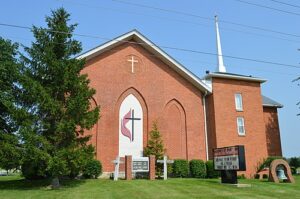 Evangelical United Brethren church. I know it wasn’t her “style”, but during World War II gas rationing it was the nearest church.
Evangelical United Brethren church. I know it wasn’t her “style”, but during World War II gas rationing it was the nearest church.
Sometimes I stayed home with my dad. Sometimes I went to church with my mom. I never felt pressured either way.
My paternal grandfather didn’t go to church. My mom’s parents worshiped regularly, but then their only son was killed in a fiery truck crash at age 21, and after that they never went back to church. My mom said it took her years to “make her peace with God”, but she never said much about it. So my family as a whole wasn’t overtly “religious”.
The good people at our local church came regularly, read the Bible and loved Jesus. But so far as I can remember, nobody ever explained anything. (Maybe I just wasn’t paying attention.) I remember a service when my good buddy Rex went forward to “give his life to Christ”. My reaction was: Why? What’s this all about?
However, I remember one Maundy Thursday (Holy Thursday) Communion service, when something (Someone?) touched me deeply. And there was that time when I went to Mass with my Catholic grandmother. All the strange language and music and ceremonial – I understood that even less. But something drew me towards it. Towards Him?
In college I dropped out of church entirely. However, during Lent my roommate, a brilliant Catholic boy, walked a mile to 7 a.m. Mass every day. So, I thought (and forgive my ridiculous ignorance), “thinking” people can take this seriously! I never asked him why, and he never said. (But, thank you, David, wherever you are, for the gift of your quiet witness.)
My third year I went to a different university far from home and, no longer living in a dorm, was very lonely – so I went to the college Methodist church hoping only to find some friends. Which I did. I was majoring in science (meteorology) where we were taught that all things must be demonstrated clearly before they can be believed. I naturally applied this to religion, as well, and I liked the rational approach 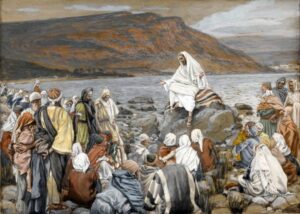 of liberal Protestantism at the time. They could explain what they believed, chiefly that Jesus was the Great Teacher – as indeed He was! I was drawn to His teachings – and to the people at the campus church who cared about each other and about me, and about the needy. They gave me the gift of a social conscience which I hadn’t had before. I started going to church fairly regularly.
of liberal Protestantism at the time. They could explain what they believed, chiefly that Jesus was the Great Teacher – as indeed He was! I was drawn to His teachings – and to the people at the campus church who cared about each other and about me, and about the needy. They gave me the gift of a social conscience which I hadn’t had before. I started going to church fairly regularly.
by James Tissot, c 1890
One Saturday afternoon I was alone, and had become interested in religion sufficiently that I was reading a book on comparative religions. When I came to the last chapter about Christianity, God “batted me over the head” with His Presence. (Over the years I have thought of no better way to put this, because it was strong! powerful! tough!) The experience lasted for a couple of days. I did not need scientific proof of it. I knew He was there. This did not fit any of my theories as to how things should work. I didn’t know what to make of it. But it was Real.
With it came an equally powerful certainty (which has lasted 61 years now) that He called me to be ordained. Me?! I had never considered such a thing. I knew little about religion. I couldn’t speak in public. I had scarcely been involved at church. I told the pastor who, after a long pause, said… “Uh…, let’s get you some vocational counseling.” Yes. It showed I should be a pastor or a social worker.
All of this definitely was not something I thought through logically. It was a “given”. It just “was” – and “is”.
So, off I went to a Methodist seminary, still not believing in Jesus Christ! It didn’t make any difference to them. But soon it did to me: A British Methodist professor, Dr Philip Watson *, taught us the Creed, and for the first time I heard an intelligent presentation of traditional Christianity. It made sense. It hung together.
And then, almost by chance, I heard a talk by the visiting Archbishop of Canterbury, Arthur Michael Ramsey, * who taught  The Faith, straight. (He was as close to being Orthodox as possible without being Orthodox. His book The Glory of God and the Transfiguration of Christ could have been written by any good Orthodox theologian. Though we do have a slight ecclesiological disagreement.) I read his book The Gospel and the Catholic Church – and I knew I had to find this “Church” he talked about.
The Faith, straight. (He was as close to being Orthodox as possible without being Orthodox. His book The Glory of God and the Transfiguration of Christ could have been written by any good Orthodox theologian. Though we do have a slight ecclesiological disagreement.) I read his book The Gospel and the Catholic Church – and I knew I had to find this “Church” he talked about.
portrait by Julia Sorrell, 1983
- Every day I pray for the souls of Philip Watson and Michael Ramsey, both now long departed. What moved me as much as their theology was the sweet gentle character of these two men. No super-emotional hard sell, no arrogance. Just the Faith from two holy men. (Years later I had the privilege of talking alone for an hour with Dr Ramsey, which only affirmed that opinion: a holy man.) What I received from them also was a gift, from them and from God.
But where was this “historic Church”? Now came the only rational part I played in this story. I decided the only sensible course to take was to find out exactly what most Christians had believed and done through the centuries and try to follow that, whatever it might be. I was shocked: Eucharist every Sunday, liturgical worship, saints, sacraments, Confession, monasticism and much more. I quickly realized that where I was then was not The Church.
So I began to search. I read and thought and visited, and read and thought and visited. They 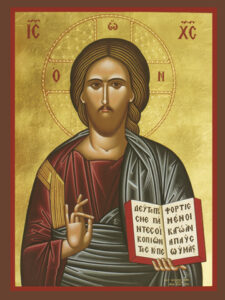 all made claims. They couldn’t all be right. * Where and which was The Real Church? I didn’t know.
all made claims. They couldn’t all be right. * Where and which was The Real Church? I didn’t know.
- It never occurred to me to consider the Roman Catholic Church – I guess because I knew I had a vocation, and I also badly wanted to be married, to have a wife and family. (Thank God for the Orthodox Church!)
One night I went to bed, and suddenly the thought came to me, “All this searching, and I don’t even know if I love Jesus!” And then [I’m not going to tell you this, it’s too personal]. But once again I didn’t have to think it out. I “knew”. And since then His love for me and my love for Him have been the center of my life.
After that as I searched, I trusted Him. I had never even thought of the Orthodox Church, that strange foreign entity. But I had been thinking about Anglicanism, and one day I found an old book by one Professor Hodges who claimed that the vocation of Anglicanism was to be ‘Western Orthodoxy”. OK, so what about Orthodoxy itself? I began to read about Eastern Orthodoxy and thought “they’ve got it right!”, and decided I should visit some Orthodox churches. Oh, help… Everything was Greek, Slavonic, Serbian. Not even any English literature. I concluded “you’ve gotta be born into that!” which was nearly true sixty years ago.
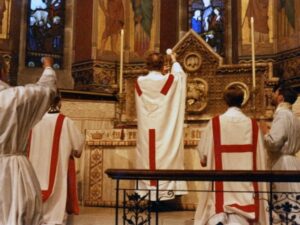 So I went with Professor Hodges’ theory and landed in an Anglo-Catholic parish where (despite some, uh, “problems” as I came to discover) the Faith was taught, and worship was glorious, filled with the presence of God. People there prayed. As I write this I remember, for the first time in all these years, walking into their side “Lady Chapel” one Sunday afternoon, to find maybe eight or nine people there praying – just praying. There was so much so good, so holy in Anglicanism – and I’m sure there still is, for there is nowhere God is not.
So I went with Professor Hodges’ theory and landed in an Anglo-Catholic parish where (despite some, uh, “problems” as I came to discover) the Faith was taught, and worship was glorious, filled with the presence of God. People there prayed. As I write this I remember, for the first time in all these years, walking into their side “Lady Chapel” one Sunday afternoon, to find maybe eight or nine people there praying – just praying. There was so much so good, so holy in Anglicanism – and I’m sure there still is, for there is nowhere God is not.
So I went to seminary and soon discovered what I already knew: that much of Anglicanism was not like my Anglo-Catholic home parish. I was ordained, and soon after, Anglicanism began its not-so-slow decline into what it is now. What a waste! I kept trying to turn my parish into something like Orthodoxy outside the Orthodox Church, and by 1985, after twenty years of trying, finally realized it can’t be done. So I began my search again.
Now, let’s go back. All this time I had believed (despite my experience!) that one ought to “think” oneself into the Faith. I had always felt rather guilty, because I knew it hadn’t happeed to me that way. I remember in seminary trying to read Thomas Aquinas, because I thought that was how one should “really” come to God. Not only could I not understand Aquinas, but after the first few paragraphs I knew that would never lead me to God. I knew that was not what had brought me to faith, that was not why I believed. I believed because God had moved in my life. Things, God-given things, had happened to me that caused me to believe. After I believed, then I had gone back and rationally tried to explain what had happened to me – why God had “hit me” that Saturday afternoon long ago in college, and all the rest. Why did it take me so long to grasp this and accept it?
And then came 1985 and God’s final irresistible move: my utterly unexpected experience with the Orthodox Church and with Saint Nicholas in Greece that summer of 1985. (See Posts 220 and following.) That, above all, was not something I had logically worked my way into. God did it, not me.
And that was it. I knew I had to be Orthodox. It took a few years, but all the while I was sure God and Nicholas were working out. And here I’ve been, “happy as a clam”, with Jesus Christ and His Holy Church for nearly 32 years now. Looking back, I can see how all my life He was bringing me here, step by step by step. And what Christ and His saints have done for me here… … are too much to even begin to tell now. From “inside” so many things look so much different.
To repeat yet again: None of this was of my doing. Except for one sensible decision, none of this was the result of my rational thinking. All of it, in many ways, was God’s doing. I can only look back and be grateful.
 Christ our Good Shepherd has many ways of seeking us and rescuing us, His lost sheep.
Christ our Good Shepherd has many ways of seeking us and rescuing us, His lost sheep.
This was story of how He found me and brought me home to Him and His Church.
Your Story
Now it’s your turn. Now, if you will, tell your own “Thomas story”. Think back at how you came to believe. Was it because of your parents, or a particular priest or bishop, or a teacher, or a friend, or through the Liturgy, or by reading the Scriptures? or another book? or perhaps once in a while something came directly from God. Remember that God works with different people in different ways. Your story will not be mine.
Please take some time for this. As you do this, I’m pretty sure events and people will come to mind that you had nearly forgotten. You needn’t write an article. I sincerely hope you don’t ramble on as long as I just did! A few notes will be sufficient – just enough to remind you of how Christ our God has shown you that He is your Lord and your God, and brought you home to Him and his Holy Church. You will be glad you did this.
And then be grateful.
Next Week: The Startling New-Martyrs Nicholas, Rafael and Irene
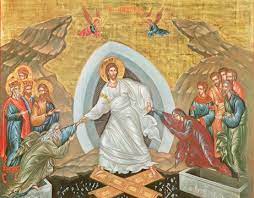
My “aha” moment was in college. Not long after I took a tour of our Greek Orthodox church, began beginners classes, and was chrismated a year later. Prior to that I had not set foot in any church for over 20 years.
Other than the icons of Christ and the Theotokos, my next icon was of St. Thomas.
I wasn’t really aware that God was leading me toward his church until I arrived. Very sneaky 🙂
I love it! He certainly moved a lot faster with you than He did with me. He must have had His reasons. Or maybe you’re a lot brighter and swifter than me?
Christ is risen!